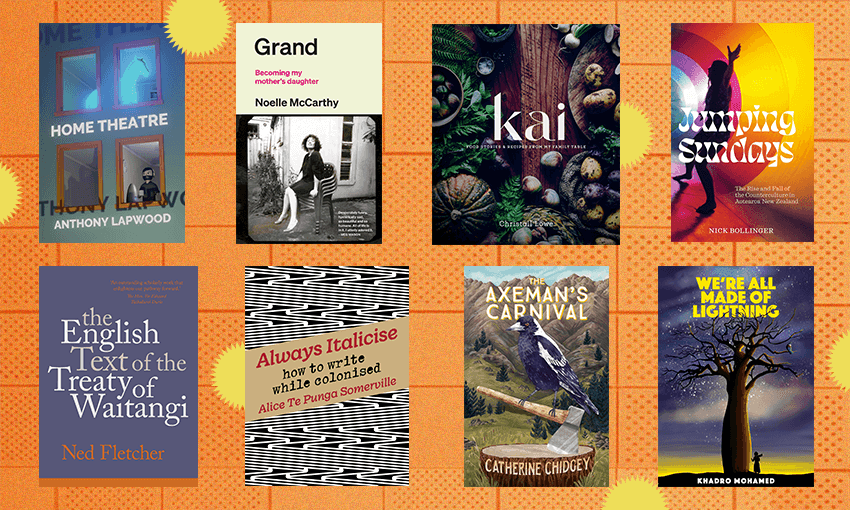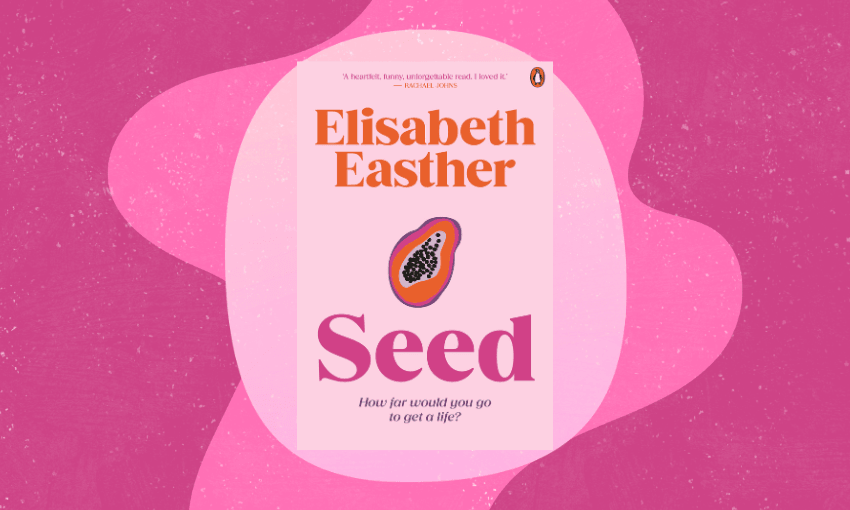Books editor Claire Mabey reports on the winners of this year’s book awards, which featured few surprises but plenty to celebrate.
Jann Medlicott Acorn Prize for Fiction ($64,000 prize)
The Axeman’s Carnival by Catherine Chidgey (published by Te Herenga Waka University Press), which is narrated by a magpie called Tama, has won the $64,000 Jann Medlicott Acorn Prize for Fiction.
The Fiction category’s convenor of judges, Stephanie Johnson, said “The Axeman’s Carnival is unique: poetic, profound and a powerfully compelling read from start to finish.”
“The unforgettable Tama – taken in and raised by Marnie on the Te Waipounamu high country farm she shares with champion axeman husband Rob – constantly entertains with his take on the foibles and dramas of his human companions. Catherine Chidgey’s writing is masterful, and the underlying sense of dread as the story unfolds is shot through with humour and humanity.”
This is the second time that Chidgey has won the award. In 2017 Chidgey’s The Wish Child won what was then the Acorn Foundation Fiction Prize, which came with a $50,000 cheque. Now called the Jann Medlicott Acorn Prize for Fiction, this year the prize money is $64,000. Medlicott, who died last year, was given a special, richly deserved shout out from the stage tonight for securing the future of the prize with her generosity.
We went full bird on The Axeman’s Carnival and commissioned fellow magpie Pecky Sharp to review Chidgey’s Tama. A human-to-human conversation between Chidgey and myself will alight right here before the end of the week (if Tama allows it).
Sidenote: Last year, Whiti Hereaka’s Kurangaituku scooped the prize for her innovative novel retelling the story of Hatupatu and the Bird Woman. Is this enough to call a trend?
Another fiction winner is the delightful Anthony Lapwood (Ngāti Ranginui, Ngāi Te Rangi, Ngāti Whakaue, Pākehā) who won the Best First Book Award (the Hubert Church Prize for Fiction) for his terrific collection of short stories, Home Theatre (published by Te Herenga Waka University Press). I have to admit to a strange sort of relief that short stories are represented again this year. It’s hellishly hard to write a good one; ludicrously hard to sell them in any decent quantities; and those who manage to do either or both deserve accolades. Ever since Airini Beautrais’ big win in 2021 for Bug Week, it feels that the form has managed to dig a few more determined toes into the oddity that is literary acclaim. Long may it last.
Mary and Peter Biggs Award for Poetry ($12,000)
Alice Te Punga Somerville (Te Āti Awa, Taranaki) has won the Mary and Peter Biggs Award for Poetry for Always Italicise: How to Write While Colonised (Auckland University Press). And we could not be more thrilled.
In our rundown of the shortlist, poetry guru Louise Wallace said: “My feeling is that Te Punga Somerville and Gildea’s collections have the complexity and nuance to mean they will be vying for the top prize.”
Always Italicise is a book that speaks across time, place and histories. With heft, nuance, and years and years of thought and study, the collection confronts the ways in which colonised published industries, academia and literary realms limit Indigenous writing and writers. For an excerpt, see this piece in e-Tangata. And watch out for some celebratory poetry from winners, as selected by poetry editor Chris Tse, here tomorrow.
The Best First Book Award (the Jessie Mackay Prize for Poetry) was won by Khadro Mohamed for We’re All Made of Lightning (We Are Babies Press, Tender Press). Of this collection, Louise Wallace said: “Mohamed’s sensory writing carries the reader along, exploring the various strands of her identity. It’s again so gratifying to see the work of publisher, Tender Press (formerly We Are Babies), recognised in this way.”
Booksellers Aotearoa New Zealand Award for Illustrated Non-Fiction ($12,000)
In a hideously tough category, we really didn’t know which lush pub was going to scoop this prize. We had our money on Te Motunui Epa by Rachel Buchanan (Taranaki, Te Ātiawa) (Bridget Williams Books) to win; but we’re more than jazzed to give a big old leap in the air for Nick Bollinger’s Jumping Sundays: The Rise and Fall of the Counterculture in Aotearoa New Zealand (Auckland University Press).
Bollinger’s epically well-researched book about turbulent times in the 1960s and 70s is both beautiful and fascinating. Category convenor Jared Davidson said: “The cover alone is one of the best of the year and signals the visual excellence that follows: vibrant endpapers, distinctive typography and bountiful images on an appropriately uncoated stock. Yet Jumping Sundays is more than just a well-designed book. Drawing on archival research and rich personal narratives, Nick Bollinger has written a compelling account of an epoch-making period, linking international trends to the local context in a purposeful-yet-playful way.
A joy to read and to hold, Jumping Sundays is a fantastic example of scholarship, creativity and craft.”
The best first book award for this category (the Judith Binney Prize for Illustrated Non-Fiction) went to the truly delightful and delicious Kai: Food Stories and Recipes from my Family Table by Christall Lowe (Ngāti Kauwhata, Tainui, Ngāti Maniapoto) (Bateman Books).
General Non-Fiction Award ($12,000 prize)
Nearly passed out with anticipation for this one. HOW DO THEY DECIDE between an agile, heart-breaking, pithy memoir like Grand: Becoming my mother’s daughter by Noelle McCarthy; and a ground-breaking academic tome on the English Text of the Treaty of Waitangi by super scholar Ned Fletcher? You can revisit my wanging on about the trials of this category here and here.
Because of course, The English Text of the Treaty of Waitangi (Bridget Williams Books) by Ned Fletcher won. How could it not? The book is the majestic outcome of a gargantuan and essential effort that feeds the entire country now and beyond our time. We are forever indebted to Morgan Godfery who reviewed it for us and said, “Fletcher’s prize piece, with the unfussy title The English Text of the Treaty of Waitangi, is an immense contribution to both history and the law.”
Category convenor of judges Anna Rawhiti-Connell (The Spinoff’s very own) says Fletcher’s book is a meticulously constructed work of scholarship that provides surprising and essential analysis of Te Tiriti. “The English Text of the Treaty of Waitangi will shift and inform debates about the intentions of those who constructed and signed the Treaty and how we interpret it today. Fletcher’s comprehensive examination sheds new light on the document’s implications and contributes fresh thinking to what remains a very live conversation for all of us that call this country home.”
Fair.
And the Grand fans among us can be comforted by the fact that McCarthy won the EH McCormick Prize for General Non-Fiction, which comes with $3,000 and a 12-month membership subscription to the New Zealand Society of Authors.
So, there we have it for another year. Get thee to your indie bookseller and sort yourself out a pile of winners for Winter. All of the books can be purchased at Unity Books Wellington and Auckland.
Claps and sherry all round for the following who made all the tough calls and who made it all happen, too:
Jann Medlicott Acorn Prize for Fiction: bestselling author, critic and creative writing teacher Stephanie Johnson (convenor); editor and literature assessor John Huria (Ngāi Tahu, Muaūpoko, Ngāti Apa ki te Rā Tō, Ngāti Rangi); Wellington bookseller Jemma Morrison; and British writer, publisher and host of the books podcast Backlisted, John Mitchinson (UK).
Mary and Peter Biggs Award for Poetry: Dunedin poet, author and creative writing tutor Diane Brown (convenor); poet and kaiako Serie Barford; and Wellington poet and Grimshaw-Sargeson Fellow Gregory Kan.
Booksellers Aotearoa New Zealand Award for Illustrated Non-Fiction: award-winning writer, historian and archivist Jared Davidson (convenor); writer and curator Dr Anna-Marie White (Te Ātiawa); and veteran television producer Taualeo’o Stephen Stehlin MNZM.
General Non-Fiction Award: writer and award-winning columnist Anna Rawhiti-Connell (convenor); prize-winning author, academic and researcher Alison Jones; and historian Professor Te Maire Tau (Ūpoko of Ngāi Tūāhuriri, a hapu of Ngāi Tahu).
The Ockham New Zealand Book Awards are supported by Ockham Residential, Creative New Zealand, Jann Medlicott and the Acorn Foundation, Mary and Peter Biggs CNZM, Booksellers Aotearoa New Zealand, the Mātātuhi Foundation, and the Auckland Writers Festival.



